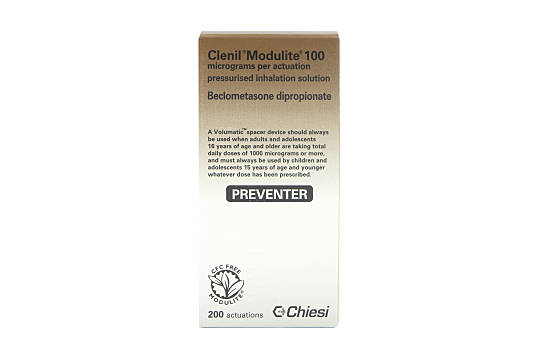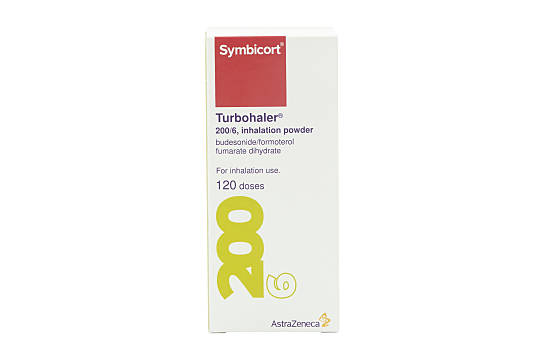Types of Asthma Inhalers

Medically reviewed by
Dr Babak AshrafiLast reviewed: 23 Jan 2023
If you have asthma you will be prescribed an inhaler by your doctor. Inhalers are used to treat the symptoms of asthma and stop asthma attacks. Different types of asthma inhalers are used for treating different aspects of asthma. It’s important to know the differences between them and how they’re used to get the most out of your treatment. Here, we’ll look at the different types of asthma inhalers and give you a clear overview on what they’re for and when you may need them.
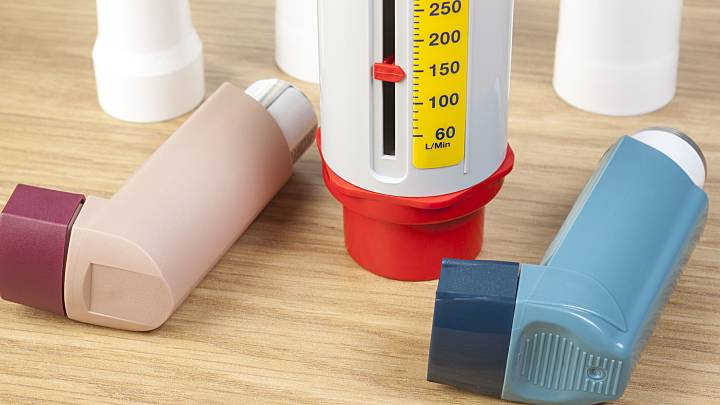
How do inhalers work?
Inhalers get treatment directly to your lungs. They deliver low doses of medications that help to relieve the symptoms of asthma like shortness of breath, wheezing, coughing, and tightness in the chest. They are also used to prevent asthma attacks.
Inhalers may not work if they are used incorrectly. Follow the instructions your doctor gives you and ask them to check how you are using your inhaler to make sure you’re getting it right.
from £11.95
from £12.95
from £22.95
from £49.95

No results found.
Please check your spelling or try another treatment name.
Types of inhalers
There are two main types of inhalers, a reliever inhaler and a preventer inhaler. Both work in the same way by delivering medication directly to the lungs. There are also combination inhalers which are usually only used as preventer inhalers.
Reliever inhalers (blue inhaler)
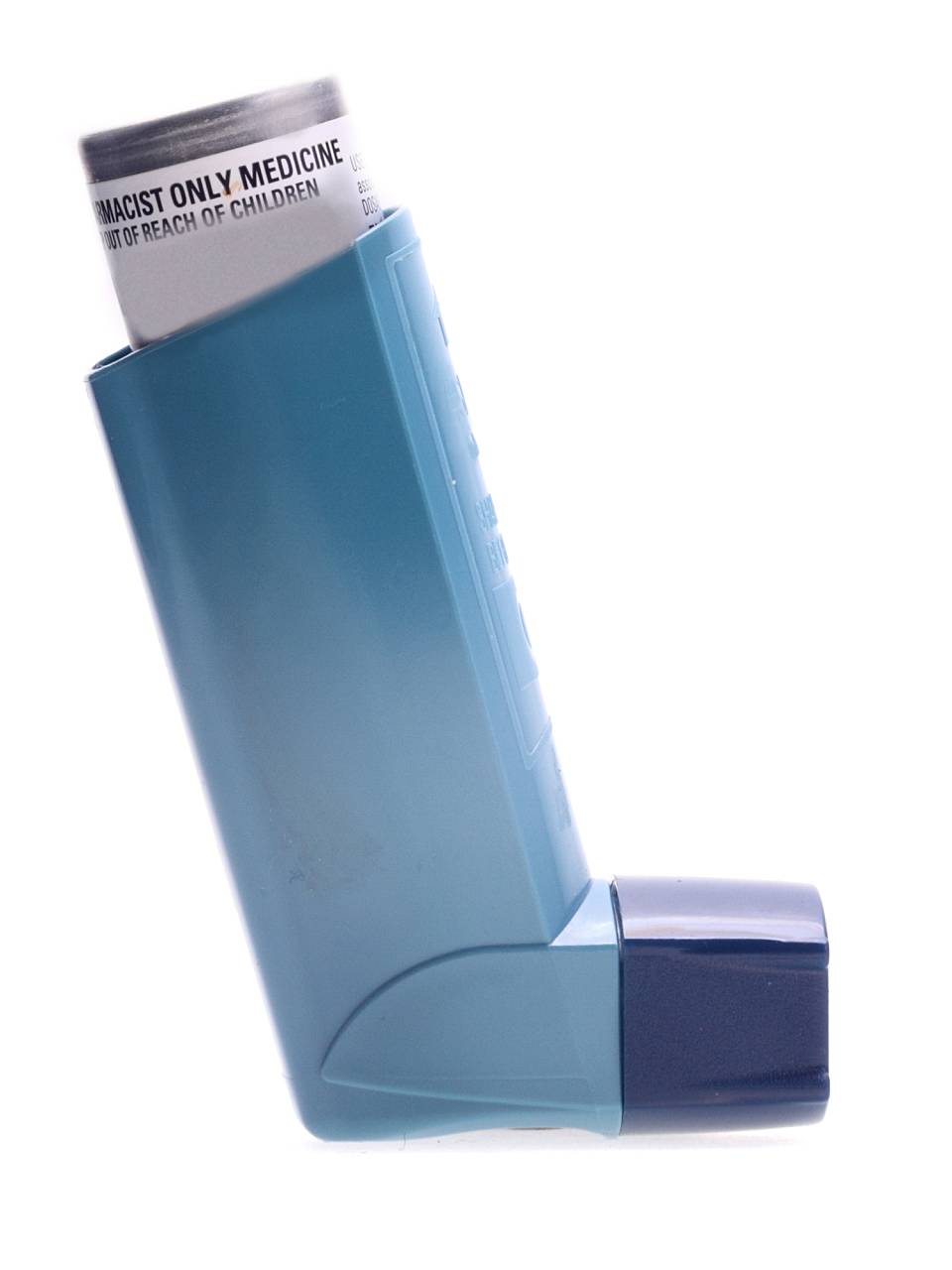
Reliever inhalers are used for quick relief from asthma symptoms. They contain a medication called a short acting bronchodilator. This medication works by opening up your airways and relaxing your chest muscles to make breathing easier.
The bronchodilator Salbutamol is the reliever most commonly prescribed by doctors, though there are others available. This type of inhaler is usually blue which helps you to identify it quickly when you need it. Reliever inhalers can be life saving if you are having an asthma attack.
When to use a reliever inhaler
Reliever inhalers should only be used when you have asthma symptoms or if you are beginning to have an asthma attack. If your asthma can be triggered by exercise you may be told to use one before exercise to prevent symptoms from happening.
Preventer inhalers (usually brown)
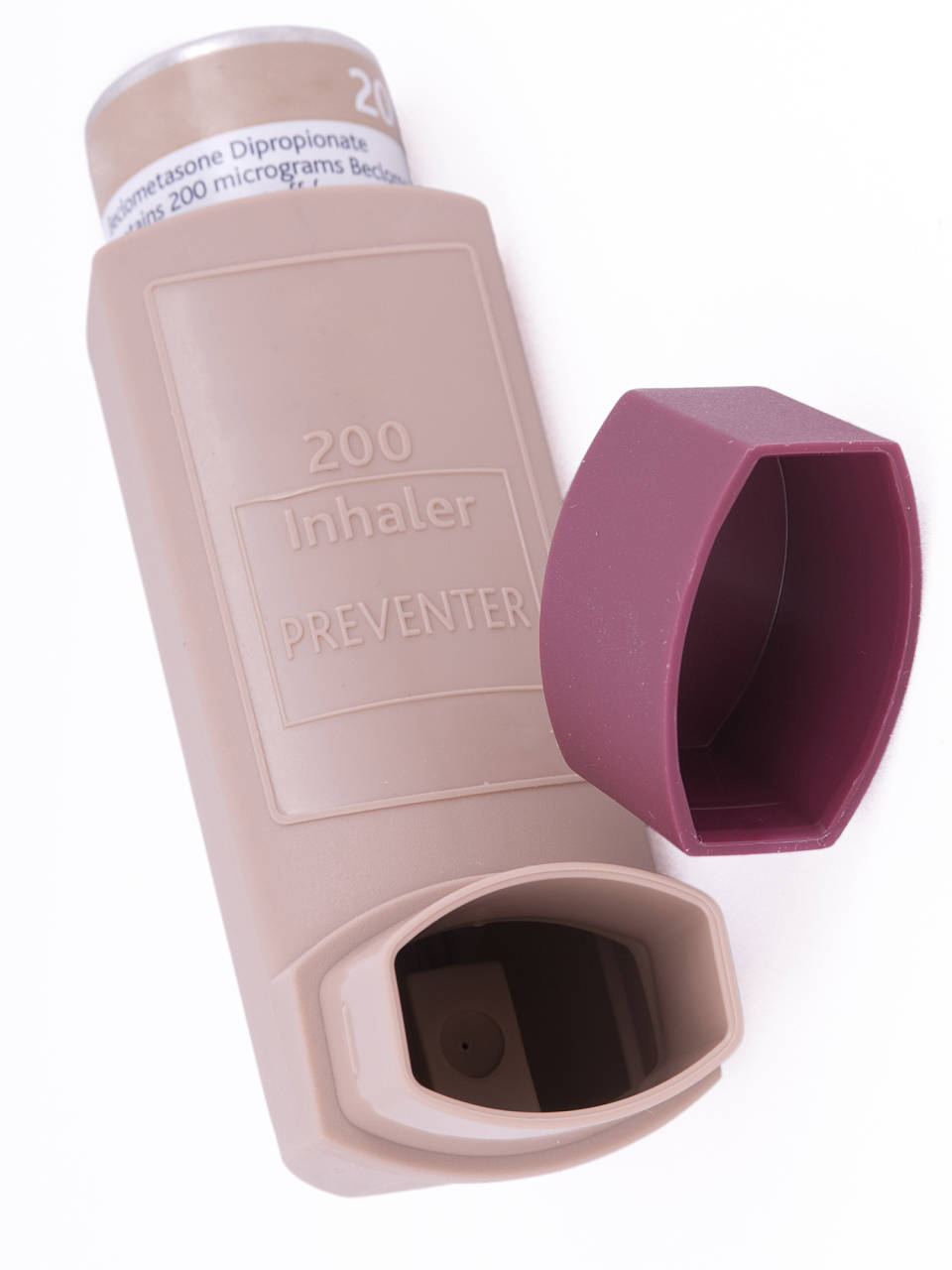
This type of inhaler helps manage the symptoms of asthma and prevent attacks from happening. They are not a relief medicine and should not be used during an asthma attack (unless you have been specifically told yours can be used as a reliever as well). They contain a low dose of a steroid that reduces the sensitivity of the airways. Combination inhalers (see below) are also preventers and contain another drug alongside the steroid. Most preventer inhalers are brown, but some can be red or pink.
When to use a preventer inhaler
Preventer inhalers should be used as prescribed by your doctor. Most prescriptions are twice a day, in the morning and in the evening. Even if your asthma symptoms are under control, you should continue following the instructions on your prescription.
Benefits of preventer inhalers
The main benefits of preventer inhalers are that they stop you experiencing asthma symptoms before they happen. They do this by making your airways less sensitive to your asthma triggers. This eases symptoms and reduces the chances of an attack, and worsening of your asthma symptoms. By doing so they improve the quality of life of asthma patients helping you to sleep better and exercise more.
How is your reliever inhaler different from your preventer inhaler?
Reliever inhalers and preventer inhalers contain different medications and are used at different times. They are different colours so you can easily tell them apart.
Reliever inhalers (blue) use fast-acting medication to ease symptoms quickly. This can stop symptoms from developing into an asthma attack and stop attacks.
Preventer inhalers (brown/red/pink) are used every day to prevent symptoms. They should not usually be used when experiencing symptoms or during an asthma attack.
Combination inhalers
Combination inhalers contain both a steroid and a bronchodilator, and are a type of preventer inhaler. If your steroid-only preventer inhaler is not treating your asthma, your doctor may change your prescription to a combination inhaler.
Combination inhalers use a long acting bronchodilator which works with the steroid to relax muscles in the lungs and open up the airways for longer periods of time.
When to use a combination inhaler
These inhalers are prescribed as a replacement for a steroid-only preventer inhaler and are used twice a day, in the morning and in the evening. They are prescribed as a step up in your asthma management when a steroid-only preventer isn’t enough to control your asthma. Always continue to use your combination inhaler even if you are feeling well and your asthma is under control, until you’ve spoken to a doctor and agree to step down together.
Types of inhaler devices
There are many different types of inhaler devices used to treat asthma. Your doctor will decide which is the best for you.
Metered dose inhalers (MDIs) are one of the most commonly prescribed types of inhalers for asthma. They are handheld devices that use a small pressurised container with a plastic mouthpiece to deliver the medication. They dispense a measured dose every time they are used. You can use a spacer device with an MDI.
Breath actuated inhalers (BAIs) do not use pressurised containers. This makes them easier to use and they are often prescribed to patients who are very young or elderly. They are small plastic devices with a mouthpiece and a patient simply breathes in to receive a dose, but it does mean you need to be able to take a deep breath in.
Dry powder inhalers do not use a spray like other types of asthma inhalers. You must inhale deeply to get the medication into the airways of the lungs. Dry powder medication can get deeper into the lungs than spray medication and is fast acting.
What is a spacer?
Spacers are plastic tubes that attach to the mouthpiece of an MDI at one end and have a mask or mouthpiece for you to use at the other end. They can help you get better results from your measured dose inhaler.
Benefits of using a spacer
Spacers can make it easier to use an MDI and make sure you receive a consistent dose of medication. Using a spacer wastes less spray so the containers will last longer and reduce the number of repeat prescriptions. You could receive up to double the amount of the drug into your lungs by using a spacer compared with not using one.
You should ideally use a spacer every time you use your MDI, but specifically, if you experience side effects from your metered dose inhaler such as a sore throat, a hoarse voice, or coughing, your doctor may recommend using a spacer. This will help to reduce these side effects while you continue to use the inhaler.
Inhaler FAQs
Which asthma inhaler is the strongest?
As asthma inhalers are used for different things, they’re not often described as being stronger than one another. Your dosage of the medication it contains may be stronger than another, but this doesn’t make it a ‘stronger’ inhaler than another.
Reliever inhalers often use salbutamol which should only be used occasionally as prescribed. The steroids used in preventer inhalers are at a very low dose and are safe to be used twice a day.
Combination preventer inhalers are the next step up for anyone who isn’t well controlled on a standard preventer.
Can asthma inhalers cause a sore throat?
A sore throat is a common side effect of using an asthma inhaler. A spacer can help prevent this side effect or your doctor may change your inhaler to find one that does not irritate your throat.
Can asthma inhalers increase my heart rate?
Salbutamol can increase the heart rate if a reliever inhaler is used too much. This is not dangerous as long as you are not experiencing chest pains at the same time. This side effect usually only lasts for half an hour but can last up to 2 to 3 hours.
Can asthma inhalers cause heartburn?
Some asthma medications can increase the chances of experiencing acid reflux or heartburn. If you experience this side effect often you should speak to your GP and consider adjusting your asthma treatment plan.
Can I use an asthma inhaler while pregnant?
Most asthma medications are safe to use when pregnant for both mother and baby. If you have asthma and are pregnant you should inform your GP and make sure your midwife knows you are asthmatic. It is also safe to breastfeed while using inhalers.
Will an asthma inhaler help with my allergies?
Inhalers should only be used to treat the symptoms of asthma, or if allergies trigger your asthma. Allergy treatment can help prevent your symptoms if allergic reactions trigger your asthma.
Can you buy asthma inhalers over the counter?
No. Asthma inhalers can only be bought with a prescription. They are only suitable for treating asthma and this must be diagnosed by your doctor.
When do asthma inhalers expire?
Inhalers usually expire around one year after they were issued. The medication could be effective for up to one year after its expiration date if it has been stored correctly.
What should I do if my inhaler doesn’t work?
If your inhaler is becoming less effective or not working you should talk to your doctor. They may change your prescription to another type of inhaler. If you are experiencing an asthma attack and your reliever inhaler is not easing your symptoms seek medical help immediately; call 999 or go to a hospital.

Dr Babak Ashrafi Clinical Lead for Service Expansion
Accreditations: BSc, MBBS, MRCGP (2008)
Babak studied medicine at King’s College London and graduated in 2003, having also gained a bachelor’s degree in Physiology during his time there. He completed his general practice (GP) training in East London, where he worked for a number of years as a partner at a large inner-city GP practice. He completed the Royal College of GPs membership exam in 2007.
Meet our doctorsLast reviewed: 23 Jan 2023
-
Asthma, National Health Service [accessed January 2023]
-
Asthma Treatment, National Health Service [accessed January 2023]
-
Asthma and pregnancy, National Health Service [accessed January 2023]
-
Spacers, Asthma.org [accessed January 2023]
-
Asthma inhalers, Patient.info [accessed January 2023]
ZAVA offers reliever inhalers to help manage asthma and for effective relief from symptoms.





